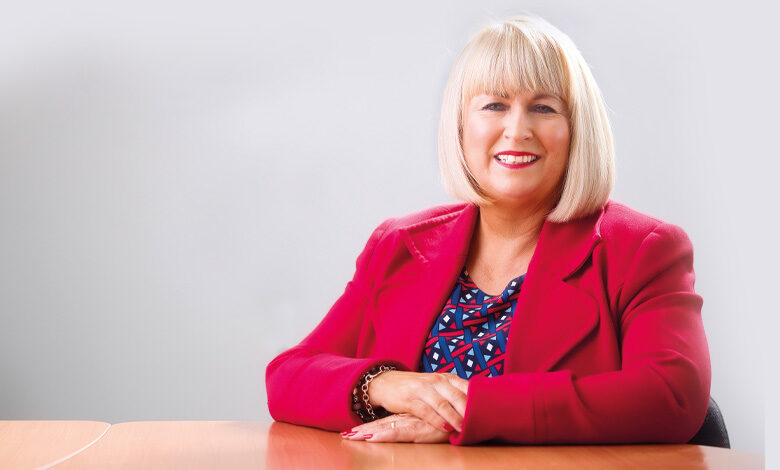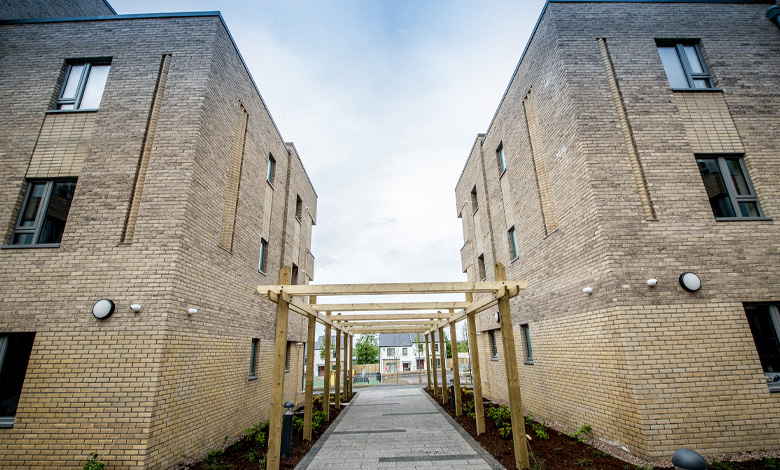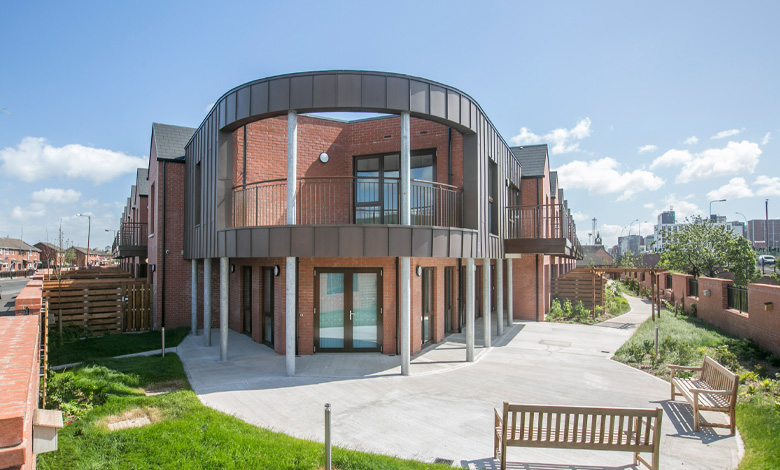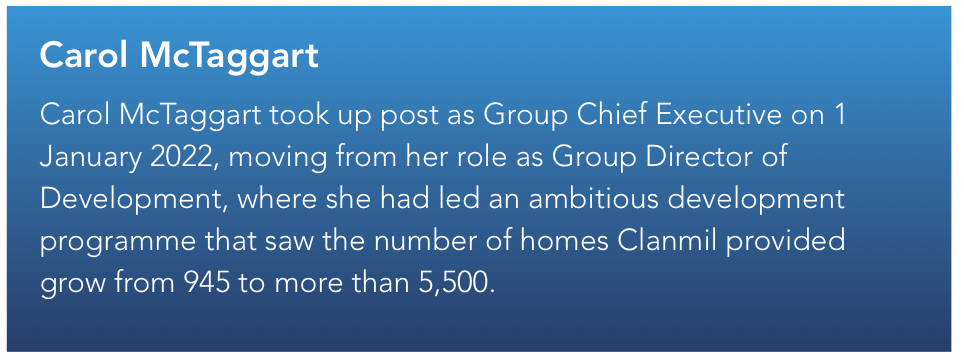Homes to live well

As the organisation works to deliver an ambitious five-year corporate plan, with revised vision and values, Group Chief Executive, Carol McTaggart, discusses the role of Clanmil Housing in delivering homes for people to live well, now and in the future.
The Chief Executive was speaking shortly after it was announced that housing associations in Northern Ireland had successfully exceeded new build targets set by the Department for Communities in the financial year 2022/23.
McTaggart believes that by surpassing the target, Northern Ireland’s 20 housing associations have clearly demonstrated their competency and capacity to deliver the new homes needed in Northern Ireland, despite challenging economic and political circumstances, proving that properly resourced housing associations can play a crucial role in improving Northern Ireland’s social and economic future.
Currently, Clanmil owns and manages some 6,000 homes, accommodating almost 12,000 people. In 2022, the organisation successfully delivered more than 300 homes for people who needed them, with a further 400 homes currently under construction.
The Chief Executive describes Clanmil as a “values-driven” organisation, focused on achieving better outcomes for customers, colleagues, and the communities it serves. This mission is driven by Clanmil’s Shaping our Future 2026 strategy, a five-year plan aimed at delivering on the housing association’s purpose of “providing homes for people to live well”.
In her previous role as Group Director of Development for Clanmil, McTaggart helped shape this five-year vision, which meant she was perfectly placed to push forward with a strategy she “passionately” believed in and “understood”, upon taking up the post of Chief Executive on 1 January 2022.
Alongside delivery of the strategic plan, Clanmil has rebranded, something McTaggart believes enables the organisation to better reflect its revised corporate values of:
- leaving a positive experience;
- believing in better; and
- achieving together.
Outlining the importance of these revised values, McTaggart says: “I am a values-driven leader, and Clanmil is a values-driven organisation. When you work at Clanmil you must embody these values. In doing so, we believe our people will do better for themselves, for their colleagues and for our customers.”

Build and maintain
One of five key pillars in Clanmil’s strategic vision is their desire to build and maintain quality homes whilst preserving the environment.
According to the Housing Executive, the strategic Housing Authority in Northern Ireland who manage the Common Housing Selection Scheme, 44,000 people in Northern Ireland are in need of a home, 33,000 of whom are deemed to be in housing stress. In the six months between July to December 2022, 7,478 households presented as homeless. Amongst them were 6,972 children.
Describing the figures as “staggering”, McTaggart says that this growing housing need is why the housing sector is so important, and why existing challenges must be overcome.
The draft Housing Supply Strategy, published shortly before the collapse of the Northern Ireland Executive, sets out an ambition for 100,000 new homes to be built in Northern Ireland over the next 15 years, of which 30 per cent are to be social homes.
Contextualising the scale of the challenge, McTaggart explains: “What that target means is that as a sector we need to build around 2,000 new social homes each year. Last year demonstrated the ability of Northern Ireland’s housing associations to deliver, despite the challenges we face. However, recent budget indications are that the Capital House Building Programme is going to be cut by around 15 per cent.
“If these cuts are imposed in 2023/24 this could mean a fall in the number of new social homes built this year from 2,000 to 1,400. That is around 600 much needed new homes not being built at a time when the number of households in housing stress is the highest it has been in 10 years. Set this alongside the worst cost-of-living crisis in a decade, when interest rates are at a 15-year high, and we surely must be doing more, not less.”
McTaggart argues that part of the solution is properly funding housing associations to build more social homes. However, she recognises that finance is not the sole barrier to delivery. She says that a lack of available land, capacity restraints on water and wastewater infrastructure, and failure to implement planning reforms recommended in a recent Northern Ireland Audit Office report, are all serving as barriers to delivery.
“If the question is ‘what needs to be done?’, then the answer is that there is not just one strategic lever. If we are truly to address Northern Ireland’s housing crisis, we need to keep housing high on the political agenda, we need a multi-year budget with appropriate funding guaranteed, we need reform of planning, and we need to sort out infrastructure capacity.”
“The solutions to many of our challenges are out there. The key is to develop our strategic thinking and collaborate to drive better outcomes for the region as a whole.”
Carol McTaggart, Group Chief Executive, Clanmil Housing
Although many of these challenges lie outside the control of housing associations, McTaggart offers the refreshingly honest opinion that housing associations do not want to sidestep the problem, they want and are willing to be part of the solution.
Investment
The Chief Executive believes that, generating an estimated £1 billion to the Northern Ireland economy annually through their house building activity, housing associations are a major economic driver.
In 2022, on the back of their strategic ambition to build 1,400 “well designed, energy efficient, mixed-tenure homes by 2026”, Clanmil secured their first private placement of £100 million.
The funding process was oversubscribed, with three successful bidders from the UK and North America. The Chief Executive believes that the process not only demonstrated the confidence of lenders in Clanmil as an organisation, but also in Northern Ireland as a viable region for investment.
“I feel we must all work together. We need our elected representatives to get back around the decision-making table, to give us the appropriate funding, so that together we can do better for Northern Ireland,” she argues.
Decarbonisation
Of course, new builds are just part of Clanmil’s strategy, with another important element being the maintenance of their existing homes. An overarching challenge in delivering both elements is decarbonisation.
The Chief Executive explains that funding for decarbonisation is a major issue for Northern Ireland’s housing associations. Other areas of the UK and Ireland are already ahead in the implementation of strategies to address this issue but with no functioning Executive, Northern Ireland is the only part of the UK and Ireland that has no strategic direction or funding stream for retrofitting social homes.
She admits that Clanmil is tackling this challenge from a solid footing, with the organisation having taken a ‘fabric first’ approach to all new build homes since 2010 and around 85 per cent of its existing homes rated EPC C or above.

Alongside a decarbonisation plan to bring all existing homes to EPC rating C by 2030, Clanmil is trialling innovative approaches to future-proof their stock, with the Chief Executive highlighting a demonstration project currently underway in Antrim, where the 36 energy efficient homes are being built to achieve SAP rating A.
McTaggart describes Clanmil as an organisation that is “keen to explore alternative methods of construction and emerging technologies. She believes that this approach could be a “gamechanger”, not only in terms of the quality of homes and the speed of delivery, but also in terms of increasing the attractiveness to young people of the construction industry as a career, potentially driving further indigenous economic prosperity.
Skills
Contesting the argument that Northern Ireland as a region no longer possesses the skills and workforce capacity to deliver the necessary housing and infrastructure, even if resources were available, McTaggart says: “The feedback we get from the construction sector is that they need certainty. The Housing Executive and housing associations together own more than 140,000 homes and if we could offer certainty of our annual programmes, with a promise of work for the next two decades, then there would be a real opportunity for Northern Ireland to develop indigenous solutions, and the skills of the future.
“The solutions to many of our challenges are out there. The key is to develop our strategic thinking and collaborate to drive better outcomes for the region as a whole,” she says.

Customer strategy
McTaggart is quick to point out that customers are central to all that Clanmil does. In December 2022, the organisation launched its first ever co-designed customer strategy, described by the Chief Executive as a “statement of intent” to rejuvenate relationships and ensure that Clanmil becomes a “truly customer-driven organisation”.
The Covid-19 pandemic impacted on how Clanmil interacted with their customers and delivered their services. McTaggart says that the customer strategy is recognition that post-pandemic, Clanmil has an opportunity to recalibrate, adding: “We need to listen to, learn from, and act upon what our customers tell us, so that we can deliver better services.
“We are excited about the journey ahead and committed to embedding a truly customer centric culture throughout Clanmil that supports our customers to live well.”
At the same time as launching the customer strategy, Clanmil also introduced a new digital strategy. This strategy focuses on equipping Clanmil’s workforce with digital tools to work better and smarter, and also targets homes, and design for a digital future.
“Our digital strategy is multi-faceted in its ambitions, but at its core, we aim to modernise and create an environment that supports communication that is engaging and responsive. That begins with ensuring our workforce is equipped to engage effectively with our customers, but also includes future-proofing our homes so that they are digitally enabled.”
Welcoming neighbourhoods
McTaggart is proud of Clanmil’s reputation as one of the largest shared neighbourhood providers in Northern Ireland. She stresses that Clanmil wants to build more shared neighbourhoods, bolstered by the results of the Northern Ireland Life and Times Survey, which showed around 78 per cent of people in the region would like to live in a mixed area.
Clanmil has committed to delivering at least five more shared neighbourhoods by 2026.
However, McTaggart is adamant that serious change is needed to the Housing Selection Scheme and the allocation process, which has been in place for over 20 years. A bone of contention for many years, a fundamental review of allocations was carried out in 2016, but none of the 20 recommendations have yet been implemented. In 2020, then Housing Minister Carál Ní Chuilín MLA announced the Department’s decision to take forward 18 of the recommendations. However, implementation is expected to take at least three years. Additionally, not included in those recommendations is a review of the current intimidation points.
McTaggart believes the allocation process, as it stands, is a barrier to creating sustainable communities. Stressing that any reformed system should still allocate on the basis of highest housing need, she says that the agreed 20 recommendations should be implemented in full to enable a diversity of customers in new developments, helping create a sustainable neighbourhood where customers can flourish and thrive.
“As a housing sector, with a wealth of experience and competence, I believe we have the ability to create a solution that makes the allocation scheme fit for purpose and allows people to live well when they move into social housing.”
McTaggart concludes by saying that as Clanmil moves into the third year of its strategic plan, come 2026 the success of the strategy will be measured by Clanmil’s provision of high quality, safe, comfortable homes that are enabling people to live well.






